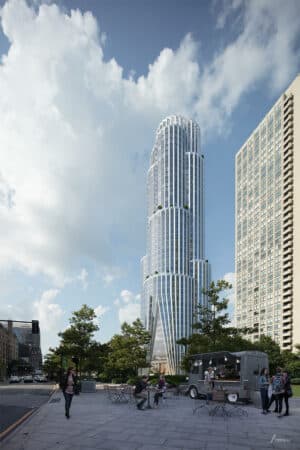
The Chiofaro Co.’s Pinnacle at Central Wharf is one of two planned towers that relied on changes to the city's waterfront zoning for permitting. Image courtesy of Kohn Pederson Fox Assoc.
Citing an urgent threat of climate change to Boston’s waterfront, acting Mayor Kim Janey said she is jettisoning the city’s rezoning of 42 acres that would allow development of a pair of new towers at the edge of Boston Harbor.
Janey said she’ll convene a new advisory group of environmentalists and community groups to design new requirements for more coastal resiliency, accessibility and inclusiveness in new developments.
“We’re a waterfront city. We know we have to act with urgency,” Janey said at a press conference Thursday.
The decision further delays two major projects under Boston Planning & Development Agency review, including The Chiofaro Co.’s more than decade-old attempt to redevelop the Harbor Garage property as a 900,000-square-foot office and residential skyscraper on East India Row. Moriarty Partners proposes a 357-room hotel tower and restaurant on the James Hook & Co. lobster pound property, which is also part of the 42-acre waterfront district affected by the decision.
Boston-based Conservation Law Foundation, which filed a lawsuit challenged the rezoning in Suffolk Superior Court, applauded Janey’s announcement.
“Boston’s developer-driven municipal harbor plan process is fundamentally flawed, and the Downtown MHP would have resulted in less public access to one of the city’s greatest treasures – Boston Harbor. It’s time to reform the planning processes for all waterfront neighborhoods to elevate the public’s voice and right to access the water,” CLF President Bradley Campbell said in a statement.
In a statement, The Chiofaro Co. said it’s committed to its investment in the property which it acquired in 2007.
“The urgency for action is undeniable. We welcome conversations with all who are interested in cooperating on a viable path to a more resilient, equitable, accessible and economically vibrant downtown waterfront,” the company stated.
Janey set a high bar for energy-efficient designs, calling on any future developments in the area to attain Net Zero standards, in which they don’t generate any additional greenhouse gas emissions.
Conservation Law Foundation had urged Janey to withdraw the municipal harbor plan zoning document, which would have allowed taller buildings and denser development between the Hook Wharf property and Christopher Columbus Park. As a tradeoff, the developers would be required to pay for upgrades to facilities to access the waterfront, in exchange for exemptions from state regulations limiting the scale of waterfront developments.
CLF and trustees of the Harbor Towers condo II property filed lawsuits challenging the state’s approval of the new zoning, and Suffolk Superior Court Justice Brian Davis overturned the plan in May.
Since then, the state Department of Environmental Protection has been attempting to correct procedural errors cited in Davis’ ruling by reapproving harbor plans by Boston and other communities.
With a preliminary election looming on Sept. 14, mayoral candidates challenging Janey have been outspoken in their criticisms of how the city has handled waterfront development in recent years under her predecessor Marty Walsh. City councilors Michelle Wu, Andrea Campbell, Annissa Essaibi George and former Boston economic development chief John Barros all have objected to the Pinnacle plan.
In her remarks, Janey said the decision to reboot the planning process represents “a turning point in the way we respond as a city to the threats of climate change.”
New England Aquarium leadership said Janey’s decision will allow a broader spectrum of the community to weigh in on requirements in waterfront developments.
“Hundreds of Boston residents have continually pointed out that the Downtown Waterfront Municipal Harbor Plan never fully reflected community feedback,” CEO Vikki Spruill said in a statement. “At a time of rapidly evolving knowledge about climate change and how to address it, the process did not fully consider the latest scientific data in climate resilience and comprehensive waterfront planning. Equally important, it did not incorporate best practices in public accessibility and equitable access to the waterfront.”
Praising Janey’s direction, Boston Harbor Now CEO Kathy Abbott said attention should also be focused on attempts to improve coastal resiliency in East Boston and at South Boston’s Moakley Park, which was identified in the Climate Ready Boston plan as a key coastal defense corridor.
A DEP spokesman said the agency “will review [Janey’s] request and determine next steps.”
If the state reapproves the plan, the Pinnacle and Hook Wharf projects would still need final approval from the BPDA.




 |
| 


